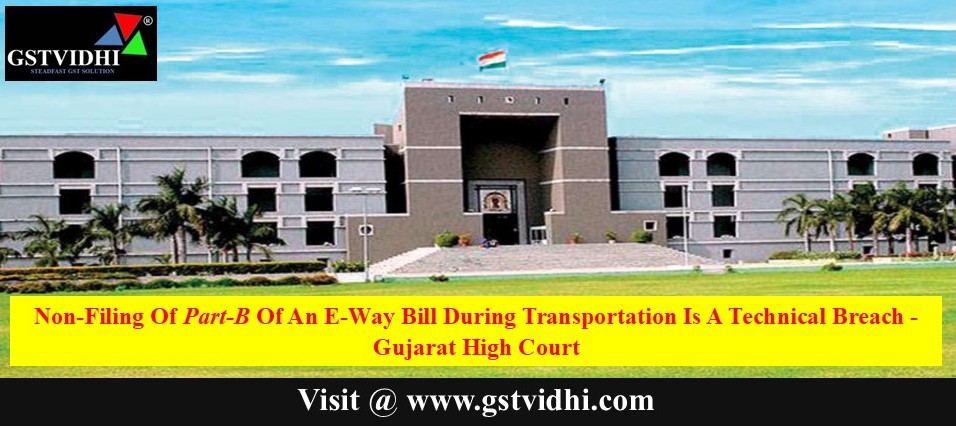
Non-Filing Of Part-B Of An E-Way Bill Is A Technical
Breach - Gujarat High Court - M/S Boron Rubbers India Vs. Union Of India & Ors.
Summary of
the Case
In a significant ruling,
the Gujarat High Court held that non-filing of Part-B of an E-Way Bill
during transportation of goods for job work, without intent to evade tax,
amounts to a technical breach and does not justify imposition of full penalty
under Section 129(1)(a) of the CGST Act. The Court reduced the penalty from
₹7,36,490 to ₹25,000 and directed refund of the balance to the petitioner.
Case: M/s Boron Rubbers
India vs. Union of India & Ors.
Order No.: R/Special
Civil Application No. 9617 of 2023
Date of Order: 27/03/2025
Court: High Court of
Gujarat at Ahmedabad
Brief Facts
of the Case
- On 07.08.2018, the petitioner
sent raw materials for job work from Gujarat to Maharashtra via Delivery
Challan and generated an E-Way Bill.
- However, Part-B (vehicle
details) of the E-Way Bill was not generated.
- Goods were intercepted on 08.08.2018
at Vasad, Gujarat.
- Detention Order in Form MOV-06
and SCN in Form MOV-07 were issued.
- The petitioner paid the penalty
amount of ₹7,36,490 under protest on 09.08.2018 to get goods
released.
- Final order in MOV-09 was
passed before the hearing date, without considering the objections
filed.
Submissions
by the Petitioner
Advocate Mr. Paresh V.
Sheth argued:
- The goods were not for supply but
sent for job work, thus exempt from tax under Section 143 of
CGST Act.
- Non-generation of Part-B was a clerical
error, not an intentional tax evasion.
- The vehicle number was mentioned on
the Delivery Challan and supported by valid documentation.
- The adjudication order was passed
prematurely before the hearing date, violating principles of
natural justice.
- Cited Dynamic Rubbers Pvt. Ltd. v.
Deputy Commissioner [(2024) 24 Centax 293 (Guj.)] for similar relief
on technical lapses.
Submissions
by the Respondents
AGP Ms. Shrunjal Shah and
Advocate Mr. Ankit Shah contended:
- Rule 138 of CGST Rules
mandates full generation of E-Way Bill, including Part-B.
- Section 129(1)(a)
of the CGST Act mandates 200% penalty for non-compliance during transport.
- Circulars relied upon by the
petitioner (like CBIC Circular No. 64/38/2018-GST) were inapplicable,
as the omission did not fall under minor errors listed.
- The petitioner admitted the lapse and
paid penalty voluntarily, hence no reason for interference.
Court’s
View and Reasoning
The Court found several
flaws in the departmental actions:
- Opportunity of hearing was denied
as the order in MOV-09 was passed on 13.08.2018, one day before the
scheduled hearing.
- The Appellate Authority’s reasoning
showed lack of application of mind, particularly in interpreting intent
to evade tax.
- The Court observed that:
“Non-generation of Part-B
of the E-Way Bill is a technical lapse when valid Delivery Challan and
Part-A were generated with vehicle details.”
The Court emphasized:
- The petitioner was not a
"supplier" making taxable supply.
- Goods were being transported for
job work, not sale, falling under Section 143 of the CGST Act.
- As per CBIC Circular 64/38/2018, minor
lapses should attract only a nominal penalty, even if not strictly
covered under clauses (a)-(f).
Final
Judgment
- Petition allowed partially.
- Penalty reduced
from ₹7,36,490 to ₹25,000 only.
- Authorities directed to refund the
excess penalty to the petitioner either in Electronic Cash Ledger
or Credit Ledger, as per the provisions of law.
- No order as to costs.
Conclusion
The judgment reiterates
that procedural errors without intent to evade tax must be treated
proportionately under GST law. The High Court rightly applied principles of
fairness and substantive justice, granting relief in a case of minor compliance
lapse. It sets an important precedent that technical lapses in E-Way
Bill documentation during bona fide job work movements should not attract harsh
penalties.
Disclaimer: All the Information is based on the notification, circular advisory and order issued by the Govt. authority and judgement delivered by the court or the authority information is strictly for educational purposes and on the basis of our best understanding of laws & not binding on anyone.
Find the Attachment (Press on Click Here )
Click here